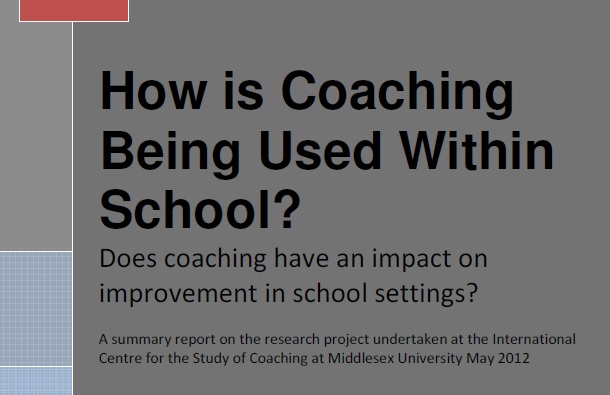Yesterday, Graham Norris shared a copy of “How is Coaching Being Used Within School? – Does coaching have an impact on improvement in school settings? A summary report on the research project undertaken at the International Centre for the Study of Coaching at Middlesex University – Dr Annette Fillery-Travis and Dr Paul Simmons – May 2012.”
Introduction
The education sector is perhaps unusual as there is, as yet, no clear definition of, or delineation between, coaching modes within the sector.
If I am honest, from my personal experience, this has not improved in the seven years since publication.
Who should coach whom, what support do they need, what benefits should be expected and in what timescale? These are all questions which need careful consideration when planning such a school-wide change.
These questions persist and are the same questions I have been researching and seeking answers for.
The document highlights the “blurring” of coaching and mentoring and recognises an important distinction between Coaching in education (internal coaching to non-reports) and business (external Coaching).
Background
The term Coaching in schools then (2012) and now, suffers as the debate between professional autonomy and expertise continues. In education, as far as I have experienced, the term Coaching remains confused – positioned as developmental rather than non-directive and non-judgmental.
Interestingly, the report highlights another second University research project highly critical of the quality of coaching practice, equally critical of the management of coaching within schools. Interesting, more often than not, Coaching is drawn towards lesson observation, hardly non-judgemental.
I did find Galucci et al. (2010) conclusions interesting, notably that teachers were not always seen to be well prepared for the facilitation skills required in coaching (2010: 923) and that peer critique does not sit easily with the cultural norms of teaching (2010:924).
Project Findings
What Constitutes Coaching within School and how is it Used?
The first graphic speaks volumes. What constitutes Coaching is broad, as is it’s purpose, heavily connected to teacher performance. Most likely, what I would reference as Instructional Coaching. 94% of Coaching undertaken by line managers.
What Impact has Coaching had in your School?
Despite significant perceptions of improvement resulting from Coaching, less than a third of schools formally measured Coaching contribution. Of their 28% that were looking at qualitative measures whereas 23 were using quantitative measures. Those shared were largely instructional and summative; quality of teaching (questioning skills in the classroom), % lesson observation grades, rise in pupil progress, one focused on behavioural data. Second
Within coaching conversations, the clients were spending a major part of their time clarifying, describing and explaining rather than analysing and generating new thinking.
Which makes me think that coaching in schools, more more closely with what I would now see as mentoring or instructional coaching, as opposed to Coaching.
What Training is provided for Coaches?
Only 16% received some form of training. 10% (535) had undertaken one day or more of training. 7% (393) had undertaken two days or more. Half of schools considered a two-day training course sufficient to enable an individual to coach one-to-one in a school. (Note that this report outlines the private sector expectation of two and five days intensive training spread out over a number of months to allow practice and application of the skills within the work place (Jarvis et al., 2006)). The accessibility of “coaching skills,” as opposed to Coaching needs to be better outlined and communicated.
Key Lessons Learned about Implementation
Staff attitudes were important. A willingness both to coach and be coached. A foundation of trust and honesty.
No examples of “major large scale,” or “whole school strategy,” implementation.
Contradictions
There were comments highlighting that time was needed for training? Given the minimal training experienced – this seems contradictory.
Clarity of purpose mattered. For one school, coaching was seen as a ‘personalised professional development opportunity rather than a strategy to address a deficit situation or poor performance’. For another, there was a clear policy to make coaching ‘an integral part of staff development, not viewed as fixing poor teachers.’
Yet the report highlights how the coaching was largely employed for instructional coaching?
The implementation barriers were informative and I would foresee these being very similar today.
- the lack of understanding, even suspicion, of what coaching is;
- misconceptions of coaching carried over from the world of sport;
- staff preferring to be told what to do; and
- pressures to show improvement quickly.
One school suggested that making coaching into a big issue was indeed a barrier in itself.
I would add that supervisory support is a prerequisite for any group of internal coaches.
Factors, which were found to support and assist the implementation of coaching, followed similar themes:
- the provision of dedicated time;
- the need for high quality training;
- the skills and credibility of the coach; and
- a readiness to be coached on the part of the client.
There is a conflicting and accurate presentation, connecting or disconnecting Coaching from Performance Management. This is most certainly a pothole to mark and resolve before you set out.
Food for thought. Coaching is an investment. Education is impatient.
…in an environment where change is such a constant, there is an overriding need for a flexible, confident and well developed workforce able to proactively manage their shifting agenda and coaching supports this type of responsiveness.
Note, that introducing Coaching, is in itself more change.
The conversations around this report continue. Jane Suter and I discussed
Internal coaches who are coaching peers they do not manage should expect to have further development and to have further developed their knowledge and expertise to the point where they are able to offer support to their fellow teacher coaches and help them in their practice.
.
Why should a coach that is coaching someone they line manage, have less development, than someone who is coaching peers? Jane and often have debate about the internal / external coach dilemma. As Jane reminds me, “…coaching a subordinate is one of the hardest things to get right – particularly in terms of the power relationships.”
Gallucci C. (2010) Instructional Coaching: Building theory about the role and organisational support for Professional Learning, American Educational Research Journal, 47 (4), 919-963


